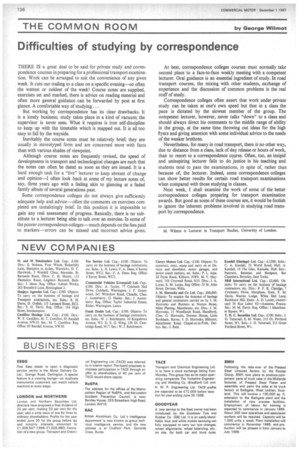Difficulties of studying by correspondence
Page 138

If you've noticed an error in this article please click here to report it so we can fix it.
THERE IS a great deal to be said for private study and correspondence courses in preparing for a professional transport examination. Work can be arranged to suit the convenience of any given week. It cuts our trailing to a class on a specific evening—so often the wettest or coldest of the week! Course notes are supplied, exercises set and marked, there is advice on reading material and often more general guidance can be forwarded by post at first glance. A comfortable way of studying ..
But working by correspondence has its clear drawbacks. It is a lonely business; study takes place in a kind of vacuum; the supervisor is never seen. What it requires is iron self-discipline to keep up with the timetable which is mapped out. It is all too easy to fall by the wayside.
Inevitably the course notes must be relatively brief; they are usually in stereotyped form and are concerned more with facts than with various shades of viewpoint.
Although course notes are frequently revised, the speed of developments in transport and technological changes are such that the notes can often be dated as soon as they are issued. It is a hard enough task for a "live" lecturer to keep abreast of change and opinion—I often look back at some of my lecture notes of, say, three years ago with a feeling akin to glancing at a faded family album of several generations past.
Some correspondence colleges do not always give sufficiently adequate help and advice—often the comments on exercises completed are tantalizingly brief. In this position it is impossible to gain any real assessment of progress. Basically, there is no substitute to a lecturer being able to talk over an exercise. In some of the poorer correspondence colleges—much depends on the fees paid to markers—errors can be missed and incorrect advice given. At best, correspondence colleges courses must normally take second place to a face-to-face weekly meeting with a competent lecturer. Oral guidance is an essential ingredient of study. In road transport courses, the mixing with other students, exchange of experience and the discussion of common problems is the real stuff of study.
Correspondence colleges often assert that work under private study can be taken at one's own speed but that in a class the pace is dictated by the slowest member of the group. The competent lecturer, however, never talks "down" to a class and should always direct his comments to the middle range of ability in the group, at the same time throwing out ideas for the high flyers and giving attention with some individual advice to the needs of the weaker brethren.
Nevertheless, for many in road transport, there is no other way, due to distance from a class, lack of day release or hours of work, than to resort to a correspondence course. Often, too, an insipid and uninspiring lecturer fails to do justice in his teaching and students tend to pass the examinations, in spite of, rather than because of, the lecturer. Indeed, some correspondence colleges can show better results for certain road transport examinations when compared with those studying in classes.
Next week, I shall examine the work of some of the better correspondence colleges preparing for transport examination awards. But good as some of these courses are, it would be foolish to ignore the inherent problems involved in studying road transport by correspondence.
M. Wilmot is Lecturer in Transport Studies, University of London.




























































































































































































